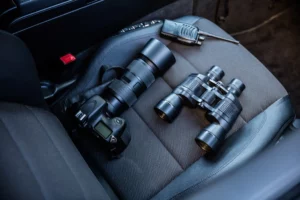Finding the right private investigator in a major metropolitan area like Houston can seem daunting. With hundreds of PIs to choose from, how do you find the one best equipped to take on your case? Whether you need surveillance, background checks, or help finding a missing person, this comprehensive guide will walk you through choosing the ideal PI to meet your unique needs in Houston.
Define Your Case Parameters

With over 800 licensed private investigation firms operating in Houston, defining your particular needs is crucial for narrowing your search. Important factors to consider include:
- Type of investigation – What exactly do you need investigated? Examples: infidelity, child custody, insurance fraud, employment screening, asset searches, missing persons.
- Specialists versus generalists – Some PIs specialize in particular types of cases while others take a variety of jobs. Match what you need to their expertise.
- Local knowledge – Find PIs intimately familiar with Houston’s neighborhoods, court system, businesses, etc.
- Budget – Houston PI fees range wildly from $50 to over $150 per hour. Define your budget to filter options.
- Timeframe – Do you need answers urgently? Make sure the PI can dedicate adequate hours within your desired timeline.
The more details you can provide upfront, the better PIs can assess if they are a good match for your case.
Search Private Investigator Directories
Now that you know exactly what you need, use PI databases and directories to find Houston investigators matching your parameters:
- Texas Association of Licensed Investigators (TALI) – All members must meet experience requirements. Search by specialties like forensic accounting or process serving.
- Houston Area Investigators Association (HAIA) – Require members have 3+ years of investigations experience. Browse member profiles for investigator bios, specialties, and client reviews.
- Greater Houston Private Investigators Association (GHPIA) – Features licensed PI firms and individual investigators across the metro region. Search by location and specialty.
- Detective Agency Directory – National directory with advanced search filters by city, fees, expertise, and years in business. Shows PI licenses.
Compile a list of promising Houston PIs from these databases that align with your case particulars.
Research Backgrounds Thoroughly

Once you have some candidates in mind, dive deeper into their backgrounds, qualifications, and track records:
- Verify licensure – Use Texas DPS license lookup to confirm active, up-to-date PI licenses. Avoid any without proper licensing.
- Look for longevity – Seasoned PIs in business 5, 10, or 20+ years have a proven history of satisfied clients.
- Check reviews – Google, Yelp and PI directories offer client reviews. Look for consistently positive feedback and responsiveness to any complaints.
- Request client referrals – Vetted referrals from past clients can provide the best insights into a PI’s work.
- Search court records – Run background checks on PIs to uncover any concerning civil or criminal records.
- Research resources – Look for PIs with modern equipment, large databases, and connections with law enforcement.
Thorough vetting weeds out any concerning history or inexperience.
Interview Investigators In-Person
Once you narrow down your options, set up in-person consultations. Meeting a PI face-to-face is the best way to assess their skills and personality. Key questions to ask:
- How many cases like mine have you handled in Houston? Look for extensive familiarity with cases similar to yours.
- Walk me through your approach to my type of investigation. See if their game plan seems tailored to your needs.
- What specific resources do you utilize for a case like this? Look for databases, connections, and tools that apply.
- What differentiates you from other Houston PIs? See if they highlight advanced skills or credentials.
- What are your rates and what is included? Get full fee breakdowns and avoid vagueness.
Pay close attention to how at ease the PI makes you feel. Do they seem truly engaged and interested in your case? You’ll likely need to meet with a few PIs before deciding on the best match.
Watch Out for Red Flags

While researching and interviewing PIs, be alert for these common warning signs:
⛔ No website or online presence
⛔ Can’t provide proof of active licensure
⛔ Vague about fees or reluctant to give estimates
⛔ Won’t provide client references
⛔ Pushes for immediate down payment
⛔ Claims law enforcement or CIA experience but no proof
⛔ Unable to articulate a specific plan for your case
One or two flags don’t necessarily eliminate a PI from consideration. But too many ringers likely indicate deeper issues.
Compare Rates
Houston PI fees typically range from $60 – $150 per hour. Higher profile or dangerous cases cost more. Corporate and insurance investigations have higher rates. Ask for flat fees when possible to avoid sticker shock from hourly bills. Get policies for retainers, expenses, hidden fees in writing upfront.
Confirm Licensed and Insured
Before signing any contract, verify:
- Active Texas private investigator license
- General liability insurance – Protects if you need to sue for damages.
- Errors and omissions insurance – Covers mistakes made during investigation.
Proper licensing and insurance provides crucial financial protections. Don’t take risks with uninsured investigators.
Additional Considerations

Request a Written Contract
Before officially hiring a Houston private investigator, insist on a comprehensive written contract detailing:
- Exact scope and parameters of the investigation
- Itemized schedule of fees and costs
- Confidentiality and non-disclosure clauses
- Ownership of evidence collected
- Billing and payment terms
- Circumstances that would require additional fees
- Conditions for terminating the contract
Review all contract terms thoroughly and clarify any vague language before signing. A clear, detailed contract protects both you and the investigator.
Discuss Ownership of Collected Evidence
Who owns the photos, videos, statements and other evidence collected during the investigation? Make sure the contract stipulates you retain ownership and can obtain copies of all evidence. But be aware PIs need to keep evidence to substantiate their work. Ensure you both get copies.
Understand PI Legal Limitations
While PIs can perform surveillance and use deception during investigations, they still must operate within legal bounds. Ethical Houston investigators will not illegally wiretap, trespass, harass subjects, or misrepresent themselves as law enforcement. Know a PI’s limitations.
Be Realistic About Possible Outcomes
Reputable Houston PIs work diligently to uncover facts, but can’t guarantee outcomes or that the investigation will conclude to your satisfaction. Evidence could support or refute your suspicions. Be prepared for all possible conclusions.
Pay Attention to Instincts During Meetings
Note any gut reactions you have during consultations. If a PI seems evasive, makes unrealistic promises, or pressures you, take heed. Don’t ignore concerns just because you urgently need answers.
Seek Second Opinions If Needed
If an investigator’s methods or findings seem questionable, discreetly consult with another experienced PI to get a second opinion. Ethical investigators will understand the need to verify in sensitive cases.
Request Regular Status Updates
Check in periodically for verbal or written status reports on the investigation’s progress, steps taken, and emerging evidence. Quality PIs provide reasonable updates to keep clients informed.
Trust Your Instincts

Finding the right PI takes time. But asking the right questions, thoroughly vetting backgrounds, and trusting your gut will lead you to a reputable investigator well-equipped for your case. Houston has no shortage of private investigators, but a bit of diligence ensures you find the ideal one to deliver you the answers and peace of mind you seek.

